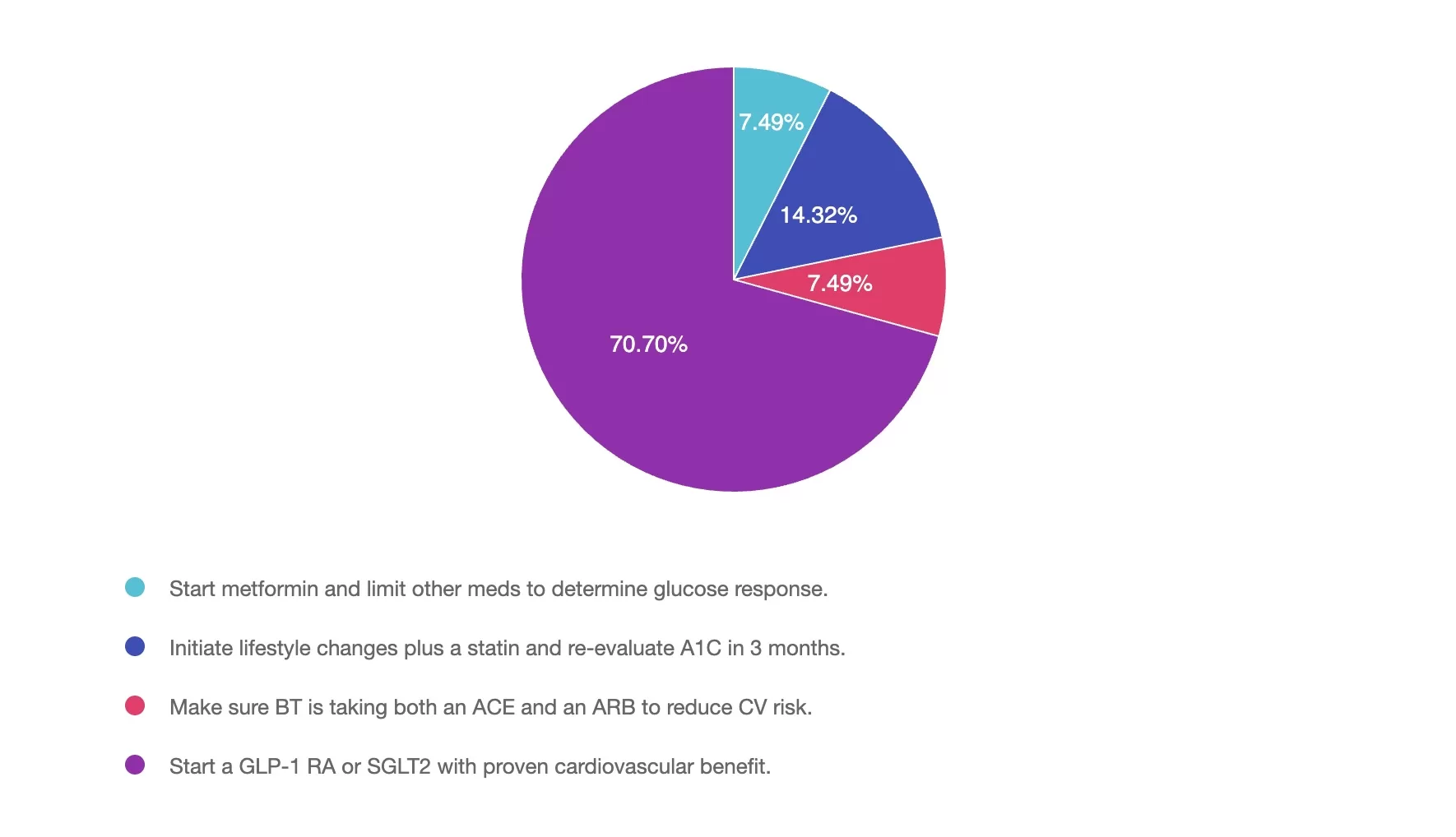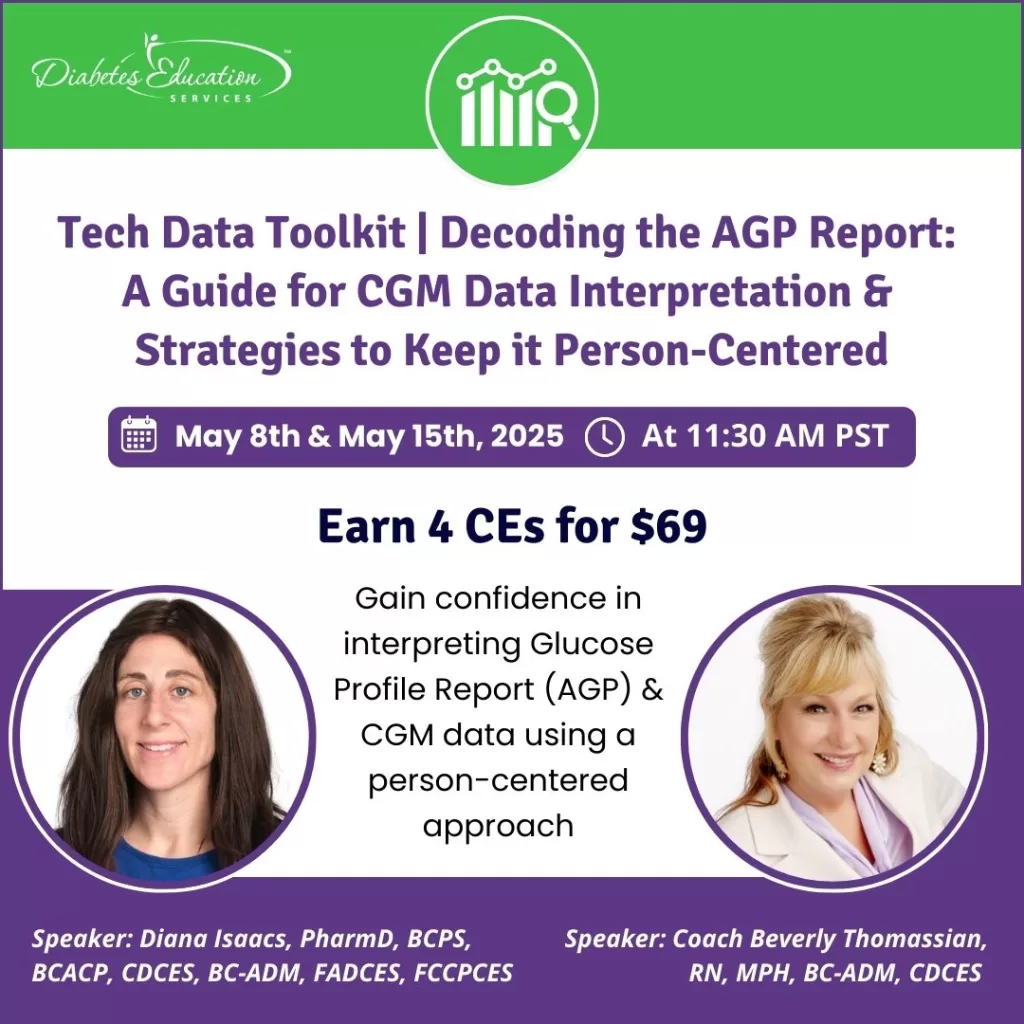For last week’s practice question, we quizzed participants on Best treatment for Diabetes + Heart Disease? 70% of respondents chose the best answer. We want to clarify and share this important information, so you can pass it on to people living with diabetes and your colleagues, plus prepare for exam success!
Before we start though, if you don’t want any spoilers and haven’t tried the question yet, you can answer it below: Answer Question

Question: BT has a history of stroke and new diagnosis of diabetes with an A1C of 6.9%.
Which of following treatment strategies is most appropriate for a person with new type 2 diabetes and established cardiovascular disease (CVD)?
Answer Choices:
- Start metformin and limit other meds to determine glucose response.
- Initiate lifestyle changes plus a statin and re-evaluate A1C in 3 months.
- Make sure BT is taking both an ACE and an ARB to reduce CV risk.
- Start a GLP-1 RA or SGLT2 with proven cardiovascular benefit.

Getting to the Best Answer
Answer 1 is incorrect. 7% chose this answer, “Start metformin and limit other meds to determine glucose response.” Based on ADA guidelines, we need to take a person’s CV and renal status into account when determining the most beneficial treatment for someone with newly diagnosed diabetes. Given the fact that BT has a history of a stroke, the MOST beneficial initial medication would be a SGLT-2 or a GLP-1 RA with proven CV benefit. Even though BT’s A1C is on target, starting either of these meds would lower their risk of another CV event. See Medication PocketCards
Answer 2 is incorrect. 14% of you chose this answer, “Initiate lifestyle changes plus a statin and re-evaluate A1C in 3 months.” Based on ADA guidelines, BT would absolutely need to be started on a statin with close monitoring of A1C coupled with lifestyle. However, we need to take a person’s CV risk status into account when determining the most beneficial treatment for someone with newly diagnosed diabetes. Given the fact that BT has a history of a stroke and new diabetes, the MOST beneficial initial medication would be a SGLT-2 or a GLP-1 RA with proven CV benefit. See Medication PocketCards
Answer 3 is incorrect. About 7% of respondents chose this, “Make sure BT is taking both an ACE and an ARB to reduce CV risk.” A person with diabetes plus hypertension and a history of stroke, would benefit from ONE of these. It is NOT recommended to take and ACE and ARB together, due the possibility of kidney complications. See HTN Med Cheat Sheets.
Finally, Answer 4 is correct. 70% chose this answer, “Start a GLP-1 RA or SGLT2 with proven cardiovascular benefit.” Based on ADA guidelines, we need to take a person’s CV risk status into account when determining the most beneficial treatment for someone with newly diagnosed diabetes. Given the fact that BT has a history of a stroke, the MOST beneficial initial medication would be a SGLT-2 or a GLP-1 RA with proven CV benefit. See Medication PocketCards.
Want to learn more about this topic? View our Level 2 Webinar – CV Disease and Decreasing Risk based on 2025 ADA Standards. Earn 1.5 CEs.
We hope you appreciate this week’s rationale! Thank you so much for taking the time to answer our Question of the Week and participate in this fun learning activity!
You won’t want to miss our upcoming Tech Data Toolkit!
Join us live on May 8th & May 15th!! Use discount code “success10” for an additional 10% off!

Session 1 – May 8th
with Beverly Thomassian at 11:30am to 12:30pm PST
Session 2 – May 15th
with Dr. Diana Isaacs at 11:30am to 2:30pm PST
If you are preparing for certification exams or want to up your game using CGM data to improve outcomes, this course is for you.
Gain confidence in interpreting Glucose Profile Report (AGP) & CGM data using a person-centered approach!
We still have room available for the May 8th kick off date.
With diabetes technology entering all aspects of diabetes care, figuring out how to make sense of all the data can seem overwhelming. Join Diana Issacs and Coach Beverly for a truly unique learning experience. Dr. Isaacs has a special knack for breaking down the essential elements of the Ambulatory Glucose Profile (AGP) report to provide participants with a clear road map for data interpretation. She includes many sample practice cases utilizing CGM data for various types of people with diabetes including type 2 and people with type 1 not on pumps.
Coach Beverly will build on Dr. Isaacs’ presentation. She will expand the focus to include steps to collaborate with the person with diabetes. Using a case study approach, she will provide strategies to integrate the AGP with person-centered care that empowers individuals to experience increased confidence in their diabetes self-management.
By attending this interactive workshop, participants will become more confident in interpreting the AGP and continuous glucose monitor (CGM) data and determining needed medication and lifestyle adjustments with a person-centered approach.
Sign up for Diabetes Blog Bytes – we post weekly Blog Bytes that are informative and FREE! Every week we post one exam practice Question of the Week and Rationale of the Week. Sign up below!
The use of DES products does not guarantee the successful passage of the certification exam. CBDCE and ADCES do not endorse any preparatory or review materials for the CDCES or BC-ADM exams, except for those published by CBDCE & ADCES.









